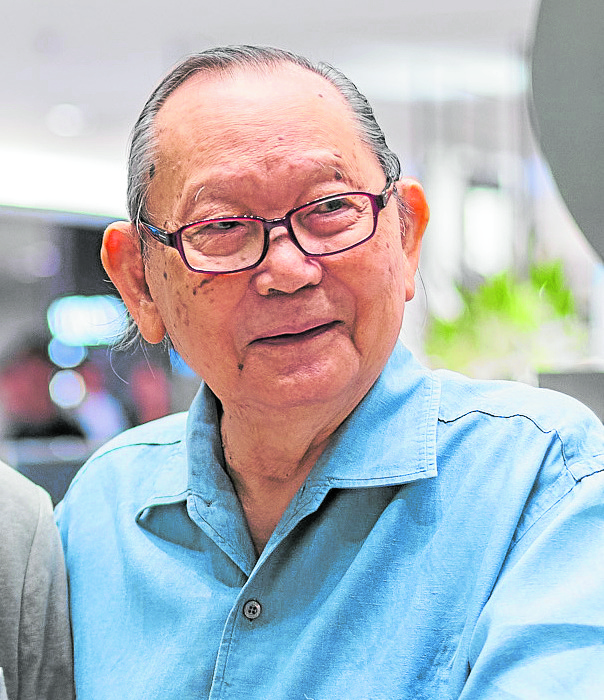
Arturo Luz. INQUIRER FILE PHOTO / JILSON SECKLER TIU
Filipino modernist master Arturo Luz, named national artist for visual arts in 1997, died Wednesday night. He was 94.
The national artist’s daughter, popular celebrity Angela Luz, made the announcement on Facebook late Tuesday: “It is with deep sorrow that I announce the passing of my father, our beloved National Artist, Arturo Luz. He peacefully joined his Creator at 8:45 this evening, and I stood by his side as he took his last breath.”
Born Arturo Rogerio Dimayuga Luz in Manila on Nov. 29, 1926, he studied at the California College of Arts and Crafts, the Brooklyn Museum, and the Academie de la Grande Chaumiere in Paris.
Over the next six decades, Luz would become one of the most influential artists in the Philippines, primarily for his minimalist paintings, distinctive for their stretched, angular, and linear figures, many of which are now considered high-ticket items. Luz achieved this by being one of the so-called “13 Moderns,” breaking away from the conservative formalism of then-leading figures such as Vicente Manansala, H.R. Ocampo, and Cesar Legaspi.
“I was slowly beginning to realize that, for me, the subject was becoming less and less important, until, as a consequence, my paintings became simpler and simpler and I eventually wound up with a few objects, mostly still life. It wasn’t the subject as such that interested me but the shapes, the linear structure,” Luz wrote for the 2017 exhibit “First Light,” which was curated by historian Ambeth Ocampo.
Different takes

Arturo Luz’s painting “Bagong Taon” was included in a commemorative stamp series on Filipino artists in 1997. —INQUIRER PHOTO
Luz often painted different takes on the same subjects over and over again, such as can be seen his “Cyclist” and “Carnival” series, but also in his still lifes, landscapes, cityscapes, among others.
“My work is relatively simple; there’s nothing complicated about it,” Luz wrote. “It involves the same problems except that I keep changing the medium. My work is linear and geometric and that’s it, essentially.”
He also worked in geometric sculpture, with his work at the Cultural Center of the Philippines (CCP), the Philippine International Convention Center, and the floor design for the Chapel of the Holy Sacrifice at the University of the Philippines Diliman.
Luz won many awards foreign and local, including the Republic Cultural Heritage Award for Painting in 1966, the Patnubay ng Sining at Kalinangan award for painting in 1980, the Order of Chevalier des Arts et Lettres from the French government in 1978, and the Gawad CCP para sa Sining in 1989.
Luz was also a mentor and supporter of other artists, notably as curator and owner of the Luz Gallery from 1960 to 2018. He was also president of the Art Association of the Philippines, director of Metropolitan Museum of Manila and director of Museum of Philippine Art.
Luz has had many exhibits here and abroad, of course, but two stand out in recent memory.
In 2017, Luz, known to be loath to see doctors, allegedly not seeing one for 35 years at that point, was hospitalized after falling into a diabetic coma.
From his hospital bed, he started drawing again, and these sketches were eventually turned into the “Hospital” series, printed on photographic paper, and exhibited at “Transformations” at the Swatch Center in Makati.
National tribute
In what may have been his final exhibit, Luz participated in an exhibit across three generations in a joint exhibit with granddaughter Paulina Luz Sotto in 2019 in Rustan’s Shangri-La.
The National Commission for Culture and the Arts has announced plans for a national tribute for Luz at the CCP though no final details have been announced.
The Luz family has set a private wake and possible interment at the Santuario de San Antonio in Forbes Park, Makati, until his eventual state interment at the Libingan ng mga Bayani.
“We could not have asked for anything more,” Angela wrote in her post. “God blessed my father with 94 of the most wonderful years on earth. He enriched our lives with his art, with his incredible talents and his genius.”

